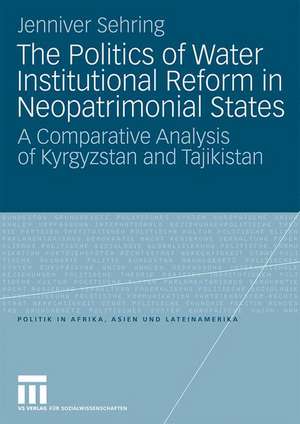The Politics of Water Institutional Reform in Neo-Patrimonial States: A Comparative Analysis of Kyrgyzstan and Tajikistan: Politik in Afrika, Asien und Lateinamerika
Autor Jenniver Sehringen Limba Engleză Paperback – 25 noi 2008
Preț: 386.61 lei
Nou
Puncte Express: 580
Preț estimativ în valută:
73.99€ • 76.96$ • 61.08£
73.99€ • 76.96$ • 61.08£
Carte tipărită la comandă
Livrare economică 15-29 aprilie
Preluare comenzi: 021 569.72.76
Specificații
ISBN-13: 9783531165080
ISBN-10: 3531165089
Pagini: 232
Ilustrații: XVI, 216 p.
Dimensiuni: 170 x 244 x 17 mm
Greutate: 0.38 kg
Ediția:2009
Editura: VS Verlag für Sozialwissenschaften
Colecția VS Verlag für Sozialwissenschaften
Seria Politik in Afrika, Asien und Lateinamerika
Locul publicării:Wiesbaden, Germany
ISBN-10: 3531165089
Pagini: 232
Ilustrații: XVI, 216 p.
Dimensiuni: 170 x 244 x 17 mm
Greutate: 0.38 kg
Ediția:2009
Editura: VS Verlag für Sozialwissenschaften
Colecția VS Verlag für Sozialwissenschaften
Seria Politik in Afrika, Asien und Lateinamerika
Locul publicării:Wiesbaden, Germany
Public țintă
Professional/practitionerCuprins
Water Governance and Water Institutional Reform.- Theoretical Framework: New Institutionalism.- Analytical framework.- Comparative Research Design.- Water Institutional Reforms in Kyrgyzstan.- Water Institutional Reforms in Tajikistan.- Comparing the Politics of Water Institutional Reform.- Conclusion.
Notă biografică
Jenniver Sehring is assistant professor at the Department of Comparative Politics at the University of Wuerzburg, Germany.
Textul de pe ultima copertă
In many countries, water institutional reforms (like the establishment of water user associations or the introduction of pricing mechanisms) are conducted in order to achieve more sustainable, efficient, and equitable water usage. Often, however, these reforms do not meet their objectives. Based on a comparative analysis of Kyrgyzstan and Tajikistan, this study highlights the long neglected role of politics. It shows how a neopatrimonial regime context impacts the reform process, focusing on the decision making, the agricultural sector, the local governance institutions, internal water-institutional linkages, and the role of international donor agencies.
Caracteristici
A Comparative Analysis of Kyrgyzstan and Tajikistan























